Exploring Professional Practice & Development in Education & Training
VerifiedAdded on 2023/06/10
|17
|5846
|352
Report
AI Summary
This report provides a comprehensive analysis of wider professional practice and development in education and training. It defines professionalism and dual professionalism, explores the influence of professional values and social, political, and economic factors on education policy. The roles of stakeholders and external bodies are examined, along with the impact of accountability on education and training. Key aspects of organizational policies and their impact on curriculum practices are analyzed. Furthermore, the report delves into quality improvement and assurance, the functions of self-assessment, and evaluates a learning program, identifying areas for improvement. The document is contributed by a student and available on Desklib, a platform offering AI-based study tools and resources for students.
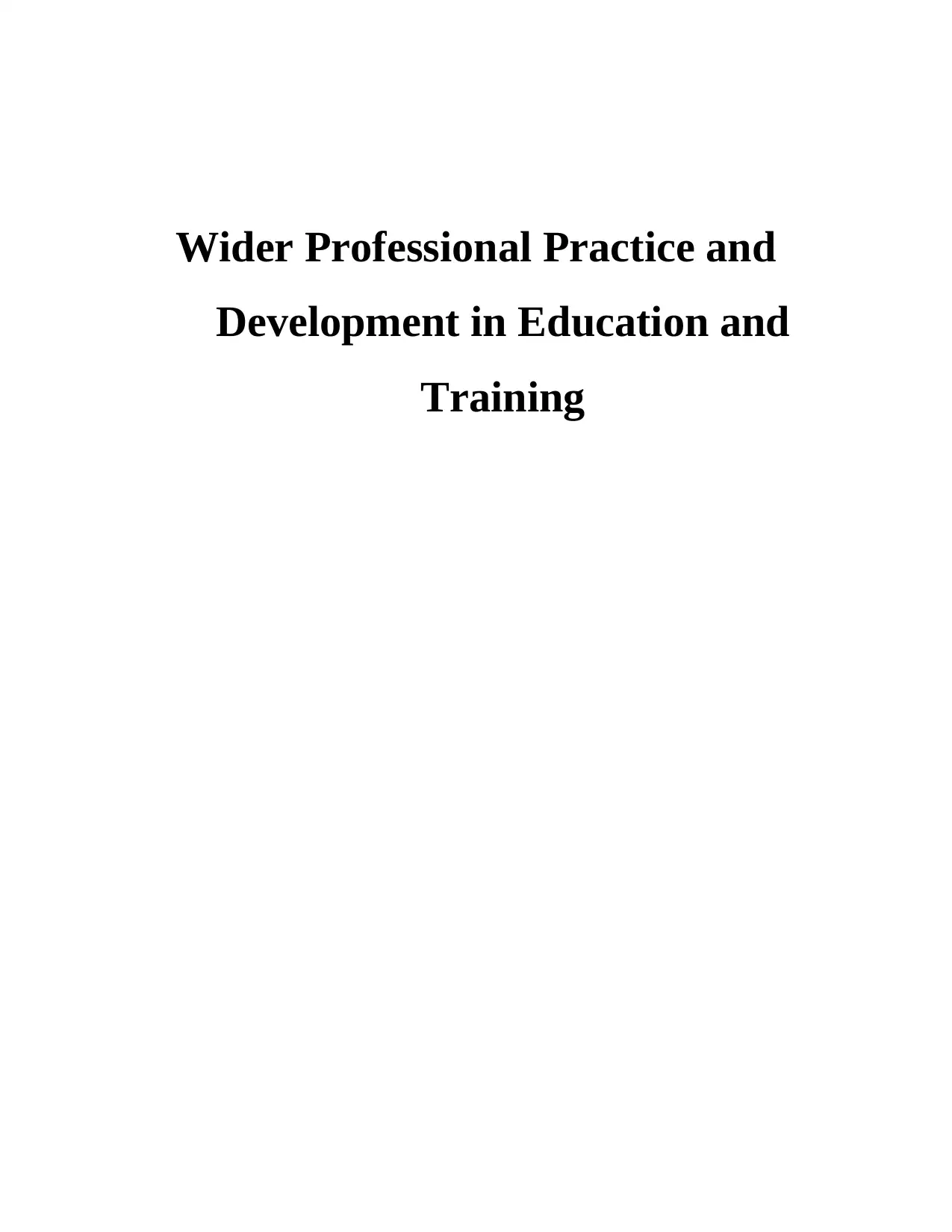
Wider Professional Practice and
Development in Education and
Training
Development in Education and
Training
Paraphrase This Document
Need a fresh take? Get an instant paraphrase of this document with our AI Paraphraser
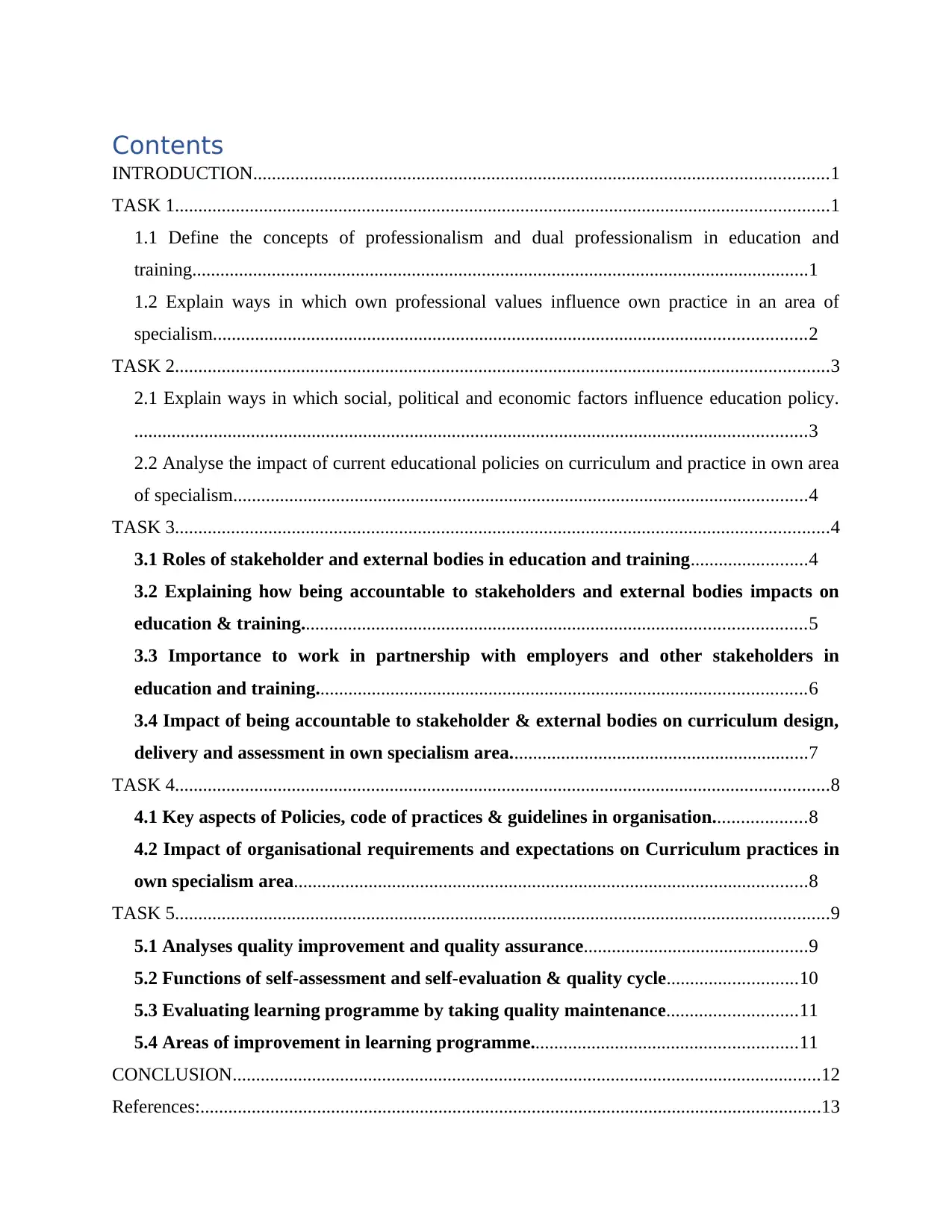
Contents
INTRODUCTION...........................................................................................................................1
TASK 1............................................................................................................................................1
1.1 Define the concepts of professionalism and dual professionalism in education and
training....................................................................................................................................1
1.2 Explain ways in which own professional values influence own practice in an area of
specialism...............................................................................................................................2
TASK 2............................................................................................................................................3
2.1 Explain ways in which social, political and economic factors influence education policy.
................................................................................................................................................3
2.2 Analyse the impact of current educational policies on curriculum and practice in own area
of specialism...........................................................................................................................4
TASK 3............................................................................................................................................4
3.1 Roles of stakeholder and external bodies in education and training.........................4
3.2 Explaining how being accountable to stakeholders and external bodies impacts on
education & training............................................................................................................5
3.3 Importance to work in partnership with employers and other stakeholders in
education and training.........................................................................................................6
3.4 Impact of being accountable to stakeholder & external bodies on curriculum design,
delivery and assessment in own specialism area................................................................7
TASK 4............................................................................................................................................8
4.1 Key aspects of Policies, code of practices & guidelines in organisation....................8
4.2 Impact of organisational requirements and expectations on Curriculum practices in
own specialism area..............................................................................................................8
TASK 5............................................................................................................................................9
5.1 Analyses quality improvement and quality assurance................................................9
5.2 Functions of self-assessment and self-evaluation & quality cycle............................10
5.3 Evaluating learning programme by taking quality maintenance............................11
5.4 Areas of improvement in learning programme.........................................................11
CONCLUSION..............................................................................................................................12
References:.....................................................................................................................................13
INTRODUCTION...........................................................................................................................1
TASK 1............................................................................................................................................1
1.1 Define the concepts of professionalism and dual professionalism in education and
training....................................................................................................................................1
1.2 Explain ways in which own professional values influence own practice in an area of
specialism...............................................................................................................................2
TASK 2............................................................................................................................................3
2.1 Explain ways in which social, political and economic factors influence education policy.
................................................................................................................................................3
2.2 Analyse the impact of current educational policies on curriculum and practice in own area
of specialism...........................................................................................................................4
TASK 3............................................................................................................................................4
3.1 Roles of stakeholder and external bodies in education and training.........................4
3.2 Explaining how being accountable to stakeholders and external bodies impacts on
education & training............................................................................................................5
3.3 Importance to work in partnership with employers and other stakeholders in
education and training.........................................................................................................6
3.4 Impact of being accountable to stakeholder & external bodies on curriculum design,
delivery and assessment in own specialism area................................................................7
TASK 4............................................................................................................................................8
4.1 Key aspects of Policies, code of practices & guidelines in organisation....................8
4.2 Impact of organisational requirements and expectations on Curriculum practices in
own specialism area..............................................................................................................8
TASK 5............................................................................................................................................9
5.1 Analyses quality improvement and quality assurance................................................9
5.2 Functions of self-assessment and self-evaluation & quality cycle............................10
5.3 Evaluating learning programme by taking quality maintenance............................11
5.4 Areas of improvement in learning programme.........................................................11
CONCLUSION..............................................................................................................................12
References:.....................................................................................................................................13

⊘ This is a preview!⊘
Do you want full access?
Subscribe today to unlock all pages.

Trusted by 1+ million students worldwide
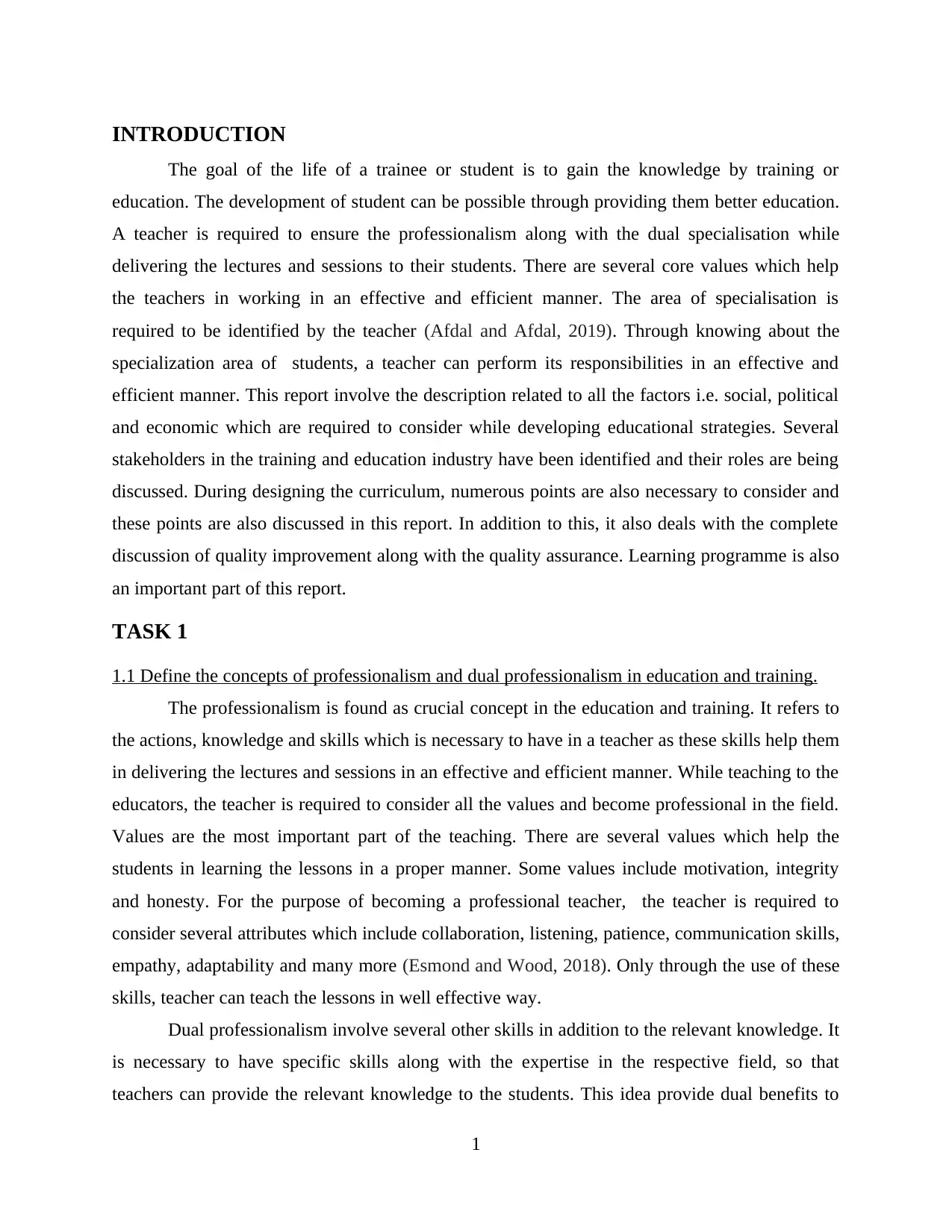
INTRODUCTION
The goal of the life of a trainee or student is to gain the knowledge by training or
education. The development of student can be possible through providing them better education.
A teacher is required to ensure the professionalism along with the dual specialisation while
delivering the lectures and sessions to their students. There are several core values which help
the teachers in working in an effective and efficient manner. The area of specialisation is
required to be identified by the teacher (Afdal and Afdal, 2019). Through knowing about the
specialization area of students, a teacher can perform its responsibilities in an effective and
efficient manner. This report involve the description related to all the factors i.e. social, political
and economic which are required to consider while developing educational strategies. Several
stakeholders in the training and education industry have been identified and their roles are being
discussed. During designing the curriculum, numerous points are also necessary to consider and
these points are also discussed in this report. In addition to this, it also deals with the complete
discussion of quality improvement along with the quality assurance. Learning programme is also
an important part of this report.
TASK 1
1.1 Define the concepts of professionalism and dual professionalism in education and training.
The professionalism is found as crucial concept in the education and training. It refers to
the actions, knowledge and skills which is necessary to have in a teacher as these skills help them
in delivering the lectures and sessions in an effective and efficient manner. While teaching to the
educators, the teacher is required to consider all the values and become professional in the field.
Values are the most important part of the teaching. There are several values which help the
students in learning the lessons in a proper manner. Some values include motivation, integrity
and honesty. For the purpose of becoming a professional teacher, the teacher is required to
consider several attributes which include collaboration, listening, patience, communication skills,
empathy, adaptability and many more (Esmond and Wood, 2018). Only through the use of these
skills, teacher can teach the lessons in well effective way.
Dual professionalism involve several other skills in addition to the relevant knowledge. It
is necessary to have specific skills along with the expertise in the respective field, so that
teachers can provide the relevant knowledge to the students. This idea provide dual benefits to
1
The goal of the life of a trainee or student is to gain the knowledge by training or
education. The development of student can be possible through providing them better education.
A teacher is required to ensure the professionalism along with the dual specialisation while
delivering the lectures and sessions to their students. There are several core values which help
the teachers in working in an effective and efficient manner. The area of specialisation is
required to be identified by the teacher (Afdal and Afdal, 2019). Through knowing about the
specialization area of students, a teacher can perform its responsibilities in an effective and
efficient manner. This report involve the description related to all the factors i.e. social, political
and economic which are required to consider while developing educational strategies. Several
stakeholders in the training and education industry have been identified and their roles are being
discussed. During designing the curriculum, numerous points are also necessary to consider and
these points are also discussed in this report. In addition to this, it also deals with the complete
discussion of quality improvement along with the quality assurance. Learning programme is also
an important part of this report.
TASK 1
1.1 Define the concepts of professionalism and dual professionalism in education and training.
The professionalism is found as crucial concept in the education and training. It refers to
the actions, knowledge and skills which is necessary to have in a teacher as these skills help them
in delivering the lectures and sessions in an effective and efficient manner. While teaching to the
educators, the teacher is required to consider all the values and become professional in the field.
Values are the most important part of the teaching. There are several values which help the
students in learning the lessons in a proper manner. Some values include motivation, integrity
and honesty. For the purpose of becoming a professional teacher, the teacher is required to
consider several attributes which include collaboration, listening, patience, communication skills,
empathy, adaptability and many more (Esmond and Wood, 2018). Only through the use of these
skills, teacher can teach the lessons in well effective way.
Dual professionalism involve several other skills in addition to the relevant knowledge. It
is necessary to have specific skills along with the expertise in the respective field, so that
teachers can provide the relevant knowledge to the students. This idea provide dual benefits to
1
Paraphrase This Document
Need a fresh take? Get an instant paraphrase of this document with our AI Paraphraser
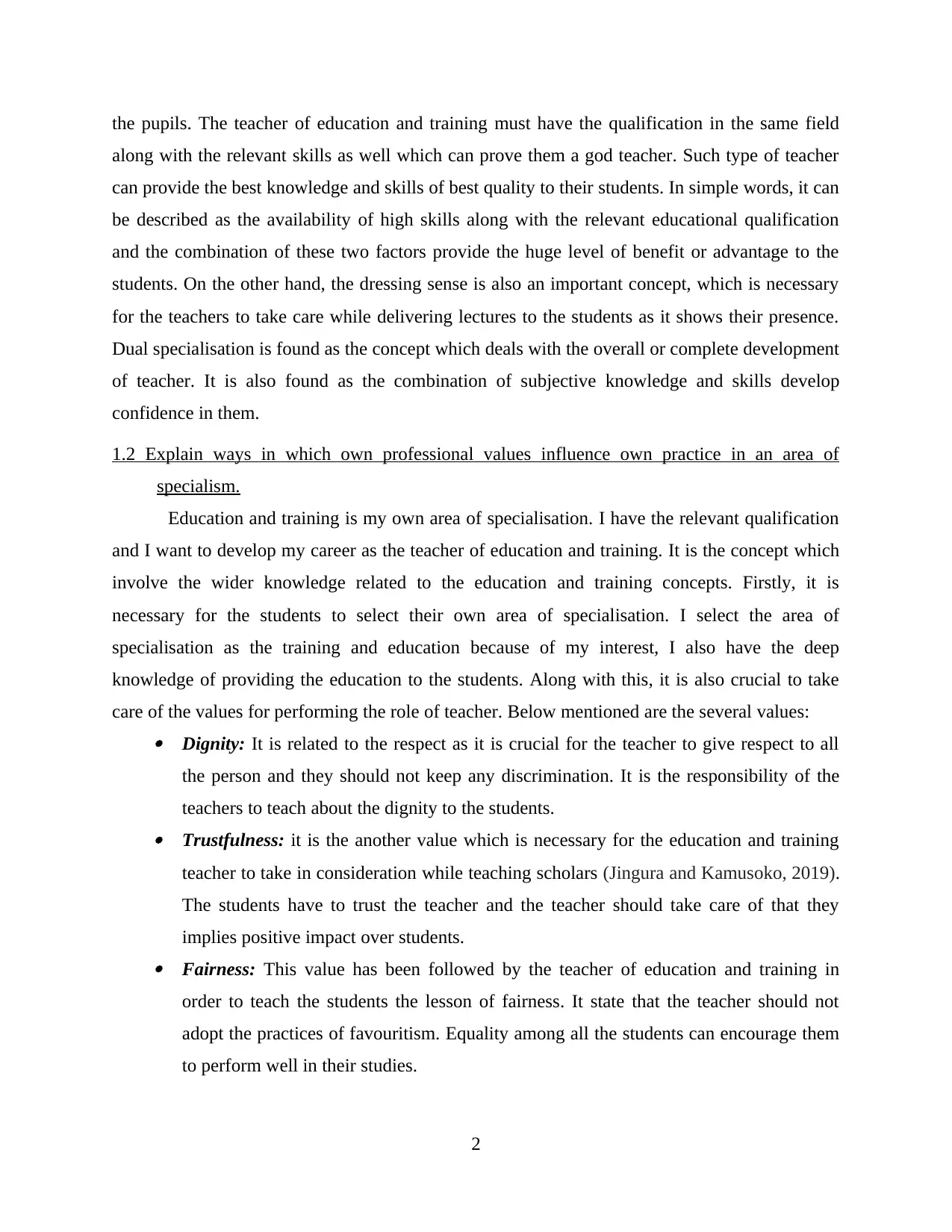
the pupils. The teacher of education and training must have the qualification in the same field
along with the relevant skills as well which can prove them a god teacher. Such type of teacher
can provide the best knowledge and skills of best quality to their students. In simple words, it can
be described as the availability of high skills along with the relevant educational qualification
and the combination of these two factors provide the huge level of benefit or advantage to the
students. On the other hand, the dressing sense is also an important concept, which is necessary
for the teachers to take care while delivering lectures to the students as it shows their presence.
Dual specialisation is found as the concept which deals with the overall or complete development
of teacher. It is also found as the combination of subjective knowledge and skills develop
confidence in them.
1.2 Explain ways in which own professional values influence own practice in an area of
specialism.
Education and training is my own area of specialisation. I have the relevant qualification
and I want to develop my career as the teacher of education and training. It is the concept which
involve the wider knowledge related to the education and training concepts. Firstly, it is
necessary for the students to select their own area of specialisation. I select the area of
specialisation as the training and education because of my interest, I also have the deep
knowledge of providing the education to the students. Along with this, it is also crucial to take
care of the values for performing the role of teacher. Below mentioned are the several values: Dignity: It is related to the respect as it is crucial for the teacher to give respect to all
the person and they should not keep any discrimination. It is the responsibility of the
teachers to teach about the dignity to the students. Trustfulness: it is the another value which is necessary for the education and training
teacher to take in consideration while teaching scholars (Jingura and Kamusoko, 2019).
The students have to trust the teacher and the teacher should take care of that they
implies positive impact over students. Fairness: This value has been followed by the teacher of education and training in
order to teach the students the lesson of fairness. It state that the teacher should not
adopt the practices of favouritism. Equality among all the students can encourage them
to perform well in their studies.
2
along with the relevant skills as well which can prove them a god teacher. Such type of teacher
can provide the best knowledge and skills of best quality to their students. In simple words, it can
be described as the availability of high skills along with the relevant educational qualification
and the combination of these two factors provide the huge level of benefit or advantage to the
students. On the other hand, the dressing sense is also an important concept, which is necessary
for the teachers to take care while delivering lectures to the students as it shows their presence.
Dual specialisation is found as the concept which deals with the overall or complete development
of teacher. It is also found as the combination of subjective knowledge and skills develop
confidence in them.
1.2 Explain ways in which own professional values influence own practice in an area of
specialism.
Education and training is my own area of specialisation. I have the relevant qualification
and I want to develop my career as the teacher of education and training. It is the concept which
involve the wider knowledge related to the education and training concepts. Firstly, it is
necessary for the students to select their own area of specialisation. I select the area of
specialisation as the training and education because of my interest, I also have the deep
knowledge of providing the education to the students. Along with this, it is also crucial to take
care of the values for performing the role of teacher. Below mentioned are the several values: Dignity: It is related to the respect as it is crucial for the teacher to give respect to all
the person and they should not keep any discrimination. It is the responsibility of the
teachers to teach about the dignity to the students. Trustfulness: it is the another value which is necessary for the education and training
teacher to take in consideration while teaching scholars (Jingura and Kamusoko, 2019).
The students have to trust the teacher and the teacher should take care of that they
implies positive impact over students. Fairness: This value has been followed by the teacher of education and training in
order to teach the students the lesson of fairness. It state that the teacher should not
adopt the practices of favouritism. Equality among all the students can encourage them
to perform well in their studies.
2
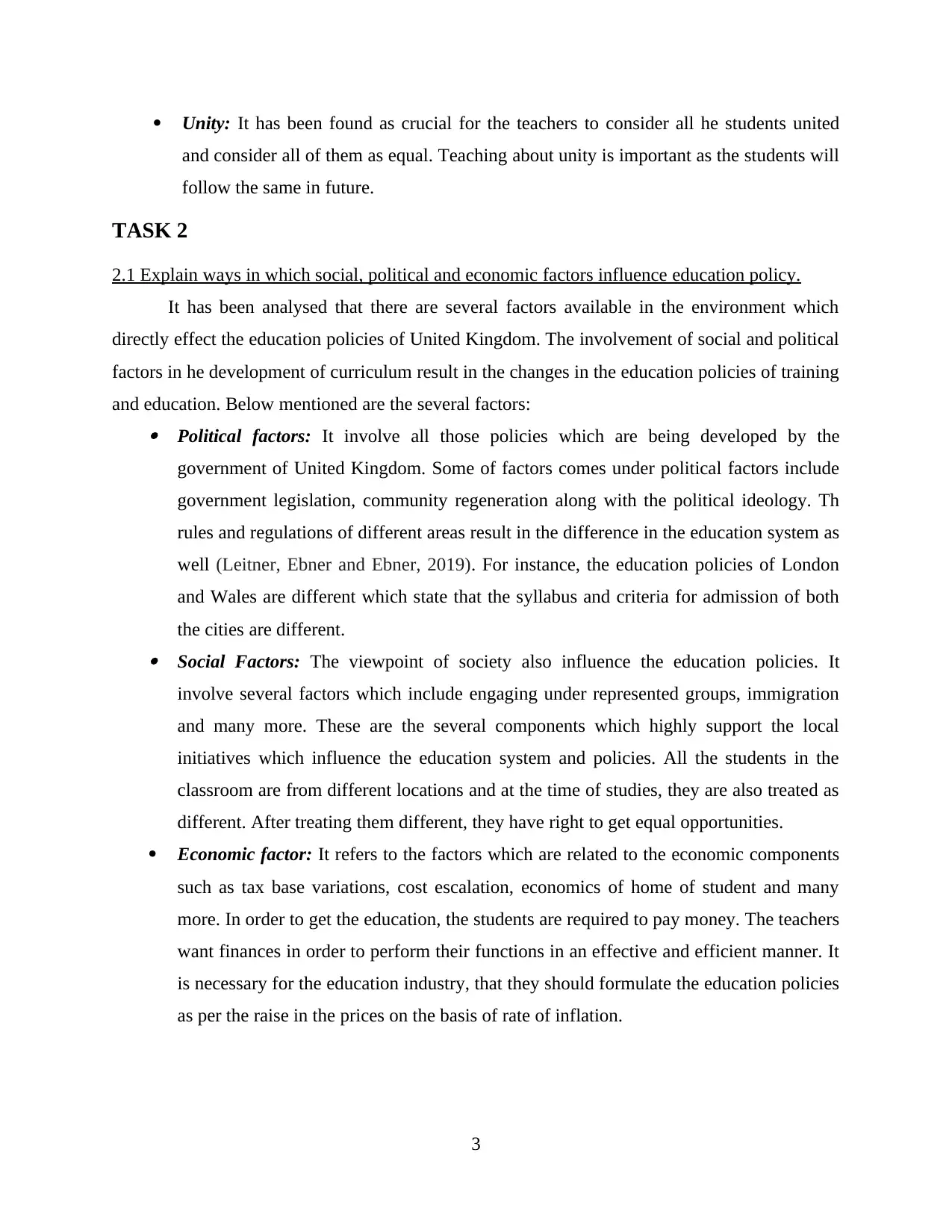
Unity: It has been found as crucial for the teachers to consider all he students united
and consider all of them as equal. Teaching about unity is important as the students will
follow the same in future.
TASK 2
2.1 Explain ways in which social, political and economic factors influence education policy.
It has been analysed that there are several factors available in the environment which
directly effect the education policies of United Kingdom. The involvement of social and political
factors in he development of curriculum result in the changes in the education policies of training
and education. Below mentioned are the several factors: Political factors: It involve all those policies which are being developed by the
government of United Kingdom. Some of factors comes under political factors include
government legislation, community regeneration along with the political ideology. Th
rules and regulations of different areas result in the difference in the education system as
well (Leitner, Ebner and Ebner, 2019). For instance, the education policies of London
and Wales are different which state that the syllabus and criteria for admission of both
the cities are different. Social Factors: The viewpoint of society also influence the education policies. It
involve several factors which include engaging under represented groups, immigration
and many more. These are the several components which highly support the local
initiatives which influence the education system and policies. All the students in the
classroom are from different locations and at the time of studies, they are also treated as
different. After treating them different, they have right to get equal opportunities.
Economic factor: It refers to the factors which are related to the economic components
such as tax base variations, cost escalation, economics of home of student and many
more. In order to get the education, the students are required to pay money. The teachers
want finances in order to perform their functions in an effective and efficient manner. It
is necessary for the education industry, that they should formulate the education policies
as per the raise in the prices on the basis of rate of inflation.
3
and consider all of them as equal. Teaching about unity is important as the students will
follow the same in future.
TASK 2
2.1 Explain ways in which social, political and economic factors influence education policy.
It has been analysed that there are several factors available in the environment which
directly effect the education policies of United Kingdom. The involvement of social and political
factors in he development of curriculum result in the changes in the education policies of training
and education. Below mentioned are the several factors: Political factors: It involve all those policies which are being developed by the
government of United Kingdom. Some of factors comes under political factors include
government legislation, community regeneration along with the political ideology. Th
rules and regulations of different areas result in the difference in the education system as
well (Leitner, Ebner and Ebner, 2019). For instance, the education policies of London
and Wales are different which state that the syllabus and criteria for admission of both
the cities are different. Social Factors: The viewpoint of society also influence the education policies. It
involve several factors which include engaging under represented groups, immigration
and many more. These are the several components which highly support the local
initiatives which influence the education system and policies. All the students in the
classroom are from different locations and at the time of studies, they are also treated as
different. After treating them different, they have right to get equal opportunities.
Economic factor: It refers to the factors which are related to the economic components
such as tax base variations, cost escalation, economics of home of student and many
more. In order to get the education, the students are required to pay money. The teachers
want finances in order to perform their functions in an effective and efficient manner. It
is necessary for the education industry, that they should formulate the education policies
as per the raise in the prices on the basis of rate of inflation.
3
⊘ This is a preview!⊘
Do you want full access?
Subscribe today to unlock all pages.

Trusted by 1+ million students worldwide
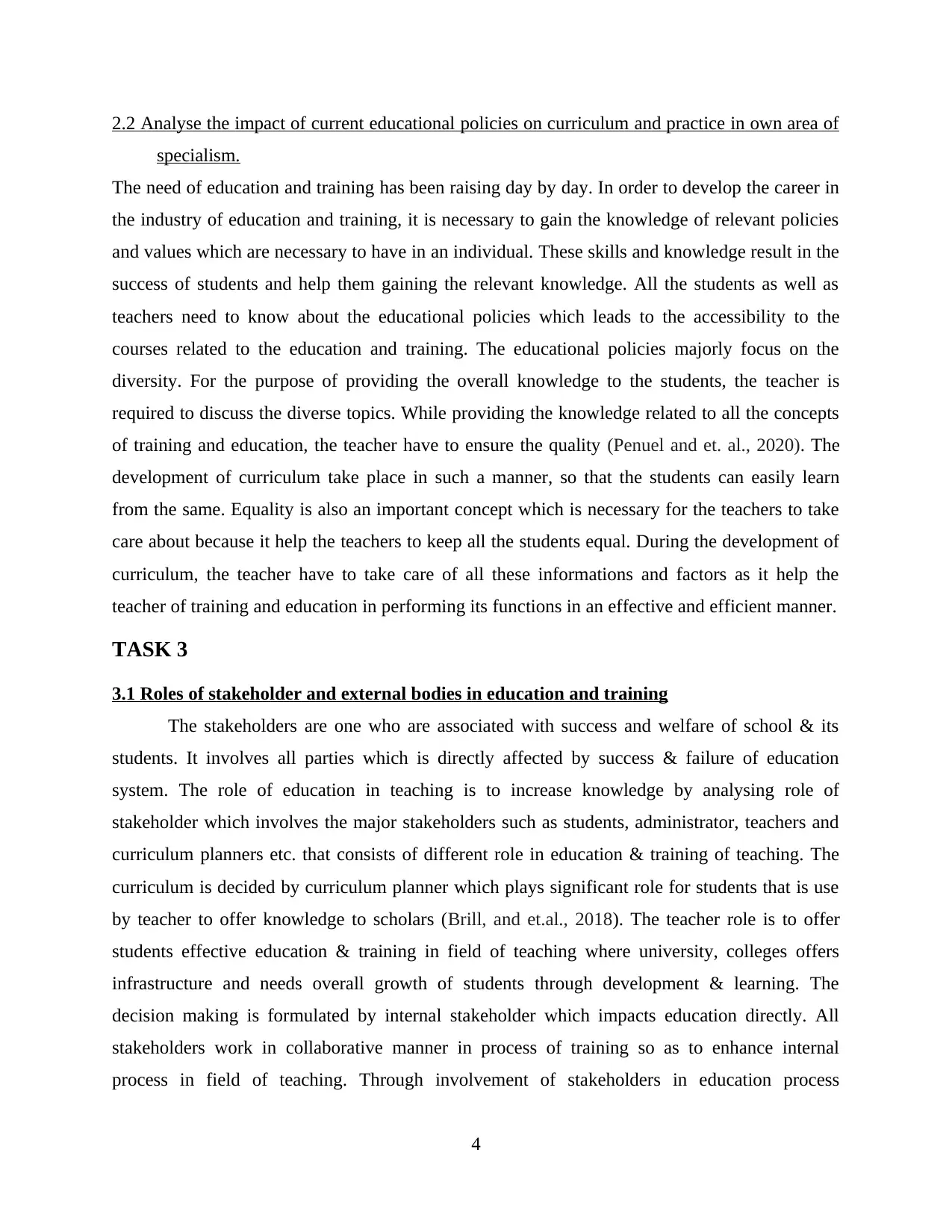
2.2 Analyse the impact of current educational policies on curriculum and practice in own area of
specialism.
The need of education and training has been raising day by day. In order to develop the career in
the industry of education and training, it is necessary to gain the knowledge of relevant policies
and values which are necessary to have in an individual. These skills and knowledge result in the
success of students and help them gaining the relevant knowledge. All the students as well as
teachers need to know about the educational policies which leads to the accessibility to the
courses related to the education and training. The educational policies majorly focus on the
diversity. For the purpose of providing the overall knowledge to the students, the teacher is
required to discuss the diverse topics. While providing the knowledge related to all the concepts
of training and education, the teacher have to ensure the quality (Penuel and et. al., 2020). The
development of curriculum take place in such a manner, so that the students can easily learn
from the same. Equality is also an important concept which is necessary for the teachers to take
care about because it help the teachers to keep all the students equal. During the development of
curriculum, the teacher have to take care of all these informations and factors as it help the
teacher of training and education in performing its functions in an effective and efficient manner.
TASK 3
3.1 Roles of stakeholder and external bodies in education and training
The stakeholders are one who are associated with success and welfare of school & its
students. It involves all parties which is directly affected by success & failure of education
system. The role of education in teaching is to increase knowledge by analysing role of
stakeholder which involves the major stakeholders such as students, administrator, teachers and
curriculum planners etc. that consists of different role in education & training of teaching. The
curriculum is decided by curriculum planner which plays significant role for students that is use
by teacher to offer knowledge to scholars (Brill, and et.al., 2018). The teacher role is to offer
students effective education & training in field of teaching where university, colleges offers
infrastructure and needs overall growth of students through development & learning. The
decision making is formulated by internal stakeholder which impacts education directly. All
stakeholders work in collaborative manner in process of training so as to enhance internal
process in field of teaching. Through involvement of stakeholders in education process
4
specialism.
The need of education and training has been raising day by day. In order to develop the career in
the industry of education and training, it is necessary to gain the knowledge of relevant policies
and values which are necessary to have in an individual. These skills and knowledge result in the
success of students and help them gaining the relevant knowledge. All the students as well as
teachers need to know about the educational policies which leads to the accessibility to the
courses related to the education and training. The educational policies majorly focus on the
diversity. For the purpose of providing the overall knowledge to the students, the teacher is
required to discuss the diverse topics. While providing the knowledge related to all the concepts
of training and education, the teacher have to ensure the quality (Penuel and et. al., 2020). The
development of curriculum take place in such a manner, so that the students can easily learn
from the same. Equality is also an important concept which is necessary for the teachers to take
care about because it help the teachers to keep all the students equal. During the development of
curriculum, the teacher have to take care of all these informations and factors as it help the
teacher of training and education in performing its functions in an effective and efficient manner.
TASK 3
3.1 Roles of stakeholder and external bodies in education and training
The stakeholders are one who are associated with success and welfare of school & its
students. It involves all parties which is directly affected by success & failure of education
system. The role of education in teaching is to increase knowledge by analysing role of
stakeholder which involves the major stakeholders such as students, administrator, teachers and
curriculum planners etc. that consists of different role in education & training of teaching. The
curriculum is decided by curriculum planner which plays significant role for students that is use
by teacher to offer knowledge to scholars (Brill, and et.al., 2018). The teacher role is to offer
students effective education & training in field of teaching where university, colleges offers
infrastructure and needs overall growth of students through development & learning. The
decision making is formulated by internal stakeholder which impacts education directly. All
stakeholders work in collaborative manner in process of training so as to enhance internal
process in field of teaching. Through involvement of stakeholders in education process
4
Paraphrase This Document
Need a fresh take? Get an instant paraphrase of this document with our AI Paraphraser
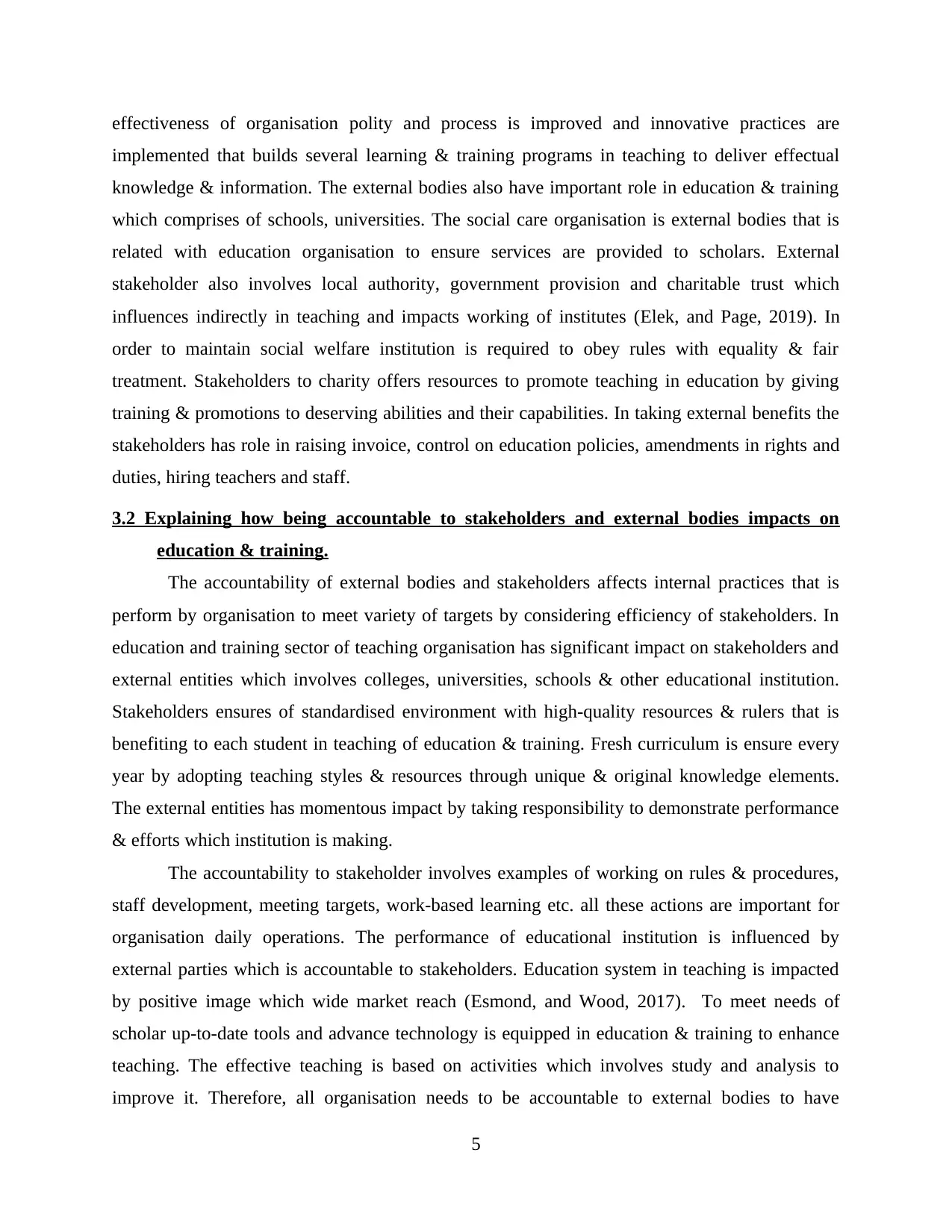
effectiveness of organisation polity and process is improved and innovative practices are
implemented that builds several learning & training programs in teaching to deliver effectual
knowledge & information. The external bodies also have important role in education & training
which comprises of schools, universities. The social care organisation is external bodies that is
related with education organisation to ensure services are provided to scholars. External
stakeholder also involves local authority, government provision and charitable trust which
influences indirectly in teaching and impacts working of institutes (Elek, and Page, 2019). In
order to maintain social welfare institution is required to obey rules with equality & fair
treatment. Stakeholders to charity offers resources to promote teaching in education by giving
training & promotions to deserving abilities and their capabilities. In taking external benefits the
stakeholders has role in raising invoice, control on education policies, amendments in rights and
duties, hiring teachers and staff.
3.2 Explaining how being accountable to stakeholders and external bodies impacts on
education & training.
The accountability of external bodies and stakeholders affects internal practices that is
perform by organisation to meet variety of targets by considering efficiency of stakeholders. In
education and training sector of teaching organisation has significant impact on stakeholders and
external entities which involves colleges, universities, schools & other educational institution.
Stakeholders ensures of standardised environment with high-quality resources & rulers that is
benefiting to each student in teaching of education & training. Fresh curriculum is ensure every
year by adopting teaching styles & resources through unique & original knowledge elements.
The external entities has momentous impact by taking responsibility to demonstrate performance
& efforts which institution is making.
The accountability to stakeholder involves examples of working on rules & procedures,
staff development, meeting targets, work-based learning etc. all these actions are important for
organisation daily operations. The performance of educational institution is influenced by
external parties which is accountable to stakeholders. Education system in teaching is impacted
by positive image which wide market reach (Esmond, and Wood, 2017). To meet needs of
scholar up-to-date tools and advance technology is equipped in education & training to enhance
teaching. The effective teaching is based on activities which involves study and analysis to
improve it. Therefore, all organisation needs to be accountable to external bodies to have
5
implemented that builds several learning & training programs in teaching to deliver effectual
knowledge & information. The external bodies also have important role in education & training
which comprises of schools, universities. The social care organisation is external bodies that is
related with education organisation to ensure services are provided to scholars. External
stakeholder also involves local authority, government provision and charitable trust which
influences indirectly in teaching and impacts working of institutes (Elek, and Page, 2019). In
order to maintain social welfare institution is required to obey rules with equality & fair
treatment. Stakeholders to charity offers resources to promote teaching in education by giving
training & promotions to deserving abilities and their capabilities. In taking external benefits the
stakeholders has role in raising invoice, control on education policies, amendments in rights and
duties, hiring teachers and staff.
3.2 Explaining how being accountable to stakeholders and external bodies impacts on
education & training.
The accountability of external bodies and stakeholders affects internal practices that is
perform by organisation to meet variety of targets by considering efficiency of stakeholders. In
education and training sector of teaching organisation has significant impact on stakeholders and
external entities which involves colleges, universities, schools & other educational institution.
Stakeholders ensures of standardised environment with high-quality resources & rulers that is
benefiting to each student in teaching of education & training. Fresh curriculum is ensure every
year by adopting teaching styles & resources through unique & original knowledge elements.
The external entities has momentous impact by taking responsibility to demonstrate performance
& efforts which institution is making.
The accountability to stakeholder involves examples of working on rules & procedures,
staff development, meeting targets, work-based learning etc. all these actions are important for
organisation daily operations. The performance of educational institution is influenced by
external parties which is accountable to stakeholders. Education system in teaching is impacted
by positive image which wide market reach (Esmond, and Wood, 2017). To meet needs of
scholar up-to-date tools and advance technology is equipped in education & training to enhance
teaching. The effective teaching is based on activities which involves study and analysis to
improve it. Therefore, all organisation needs to be accountable to external bodies to have
5
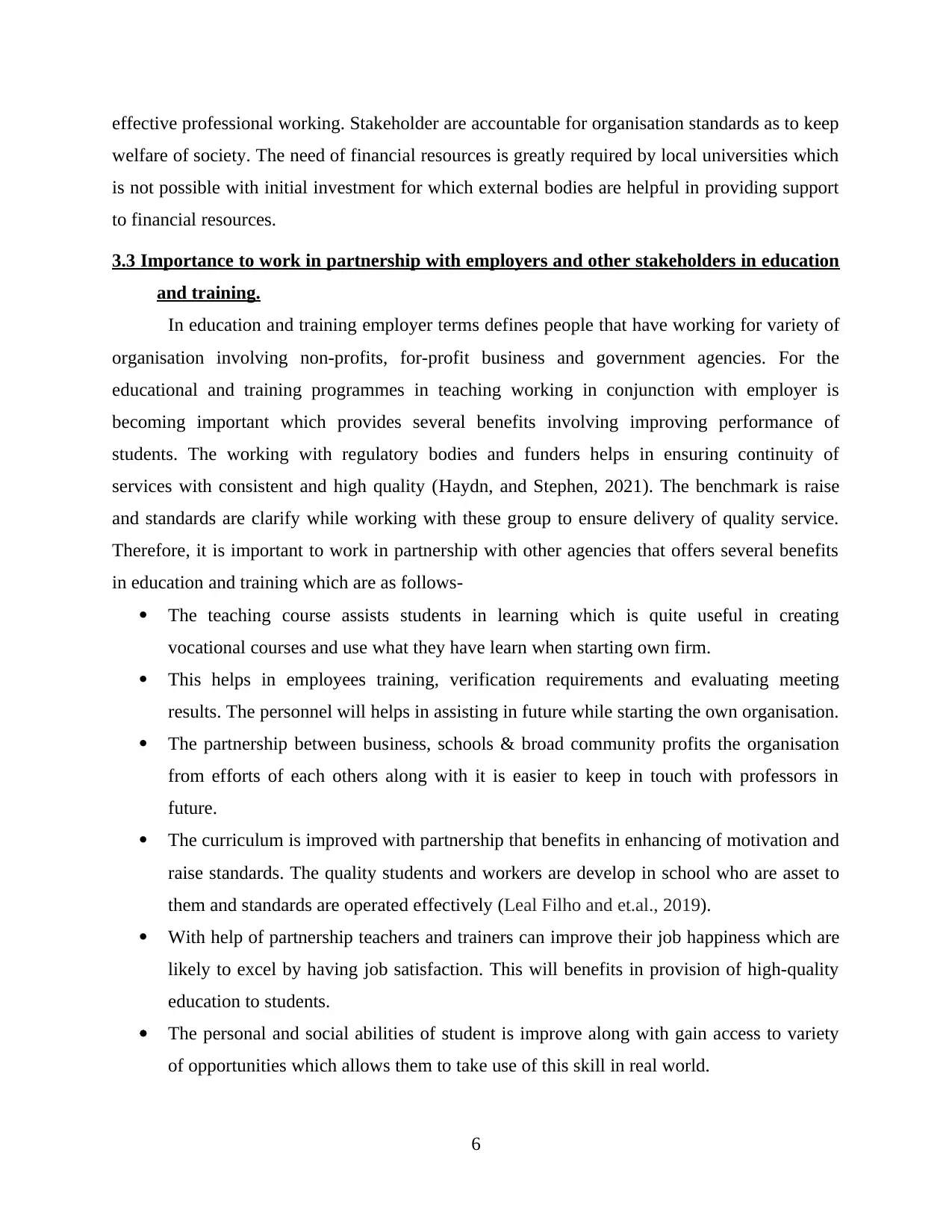
effective professional working. Stakeholder are accountable for organisation standards as to keep
welfare of society. The need of financial resources is greatly required by local universities which
is not possible with initial investment for which external bodies are helpful in providing support
to financial resources.
3.3 Importance to work in partnership with employers and other stakeholders in education
and training.
In education and training employer terms defines people that have working for variety of
organisation involving non-profits, for-profit business and government agencies. For the
educational and training programmes in teaching working in conjunction with employer is
becoming important which provides several benefits involving improving performance of
students. The working with regulatory bodies and funders helps in ensuring continuity of
services with consistent and high quality (Haydn, and Stephen, 2021). The benchmark is raise
and standards are clarify while working with these group to ensure delivery of quality service.
Therefore, it is important to work in partnership with other agencies that offers several benefits
in education and training which are as follows-
The teaching course assists students in learning which is quite useful in creating
vocational courses and use what they have learn when starting own firm.
This helps in employees training, verification requirements and evaluating meeting
results. The personnel will helps in assisting in future while starting the own organisation.
The partnership between business, schools & broad community profits the organisation
from efforts of each others along with it is easier to keep in touch with professors in
future.
The curriculum is improved with partnership that benefits in enhancing of motivation and
raise standards. The quality students and workers are develop in school who are asset to
them and standards are operated effectively (Leal Filho and et.al., 2019).
With help of partnership teachers and trainers can improve their job happiness which are
likely to excel by having job satisfaction. This will benefits in provision of high-quality
education to students.
The personal and social abilities of student is improve along with gain access to variety
of opportunities which allows them to take use of this skill in real world.
6
welfare of society. The need of financial resources is greatly required by local universities which
is not possible with initial investment for which external bodies are helpful in providing support
to financial resources.
3.3 Importance to work in partnership with employers and other stakeholders in education
and training.
In education and training employer terms defines people that have working for variety of
organisation involving non-profits, for-profit business and government agencies. For the
educational and training programmes in teaching working in conjunction with employer is
becoming important which provides several benefits involving improving performance of
students. The working with regulatory bodies and funders helps in ensuring continuity of
services with consistent and high quality (Haydn, and Stephen, 2021). The benchmark is raise
and standards are clarify while working with these group to ensure delivery of quality service.
Therefore, it is important to work in partnership with other agencies that offers several benefits
in education and training which are as follows-
The teaching course assists students in learning which is quite useful in creating
vocational courses and use what they have learn when starting own firm.
This helps in employees training, verification requirements and evaluating meeting
results. The personnel will helps in assisting in future while starting the own organisation.
The partnership between business, schools & broad community profits the organisation
from efforts of each others along with it is easier to keep in touch with professors in
future.
The curriculum is improved with partnership that benefits in enhancing of motivation and
raise standards. The quality students and workers are develop in school who are asset to
them and standards are operated effectively (Leal Filho and et.al., 2019).
With help of partnership teachers and trainers can improve their job happiness which are
likely to excel by having job satisfaction. This will benefits in provision of high-quality
education to students.
The personal and social abilities of student is improve along with gain access to variety
of opportunities which allows them to take use of this skill in real world.
6
⊘ This is a preview!⊘
Do you want full access?
Subscribe today to unlock all pages.

Trusted by 1+ million students worldwide
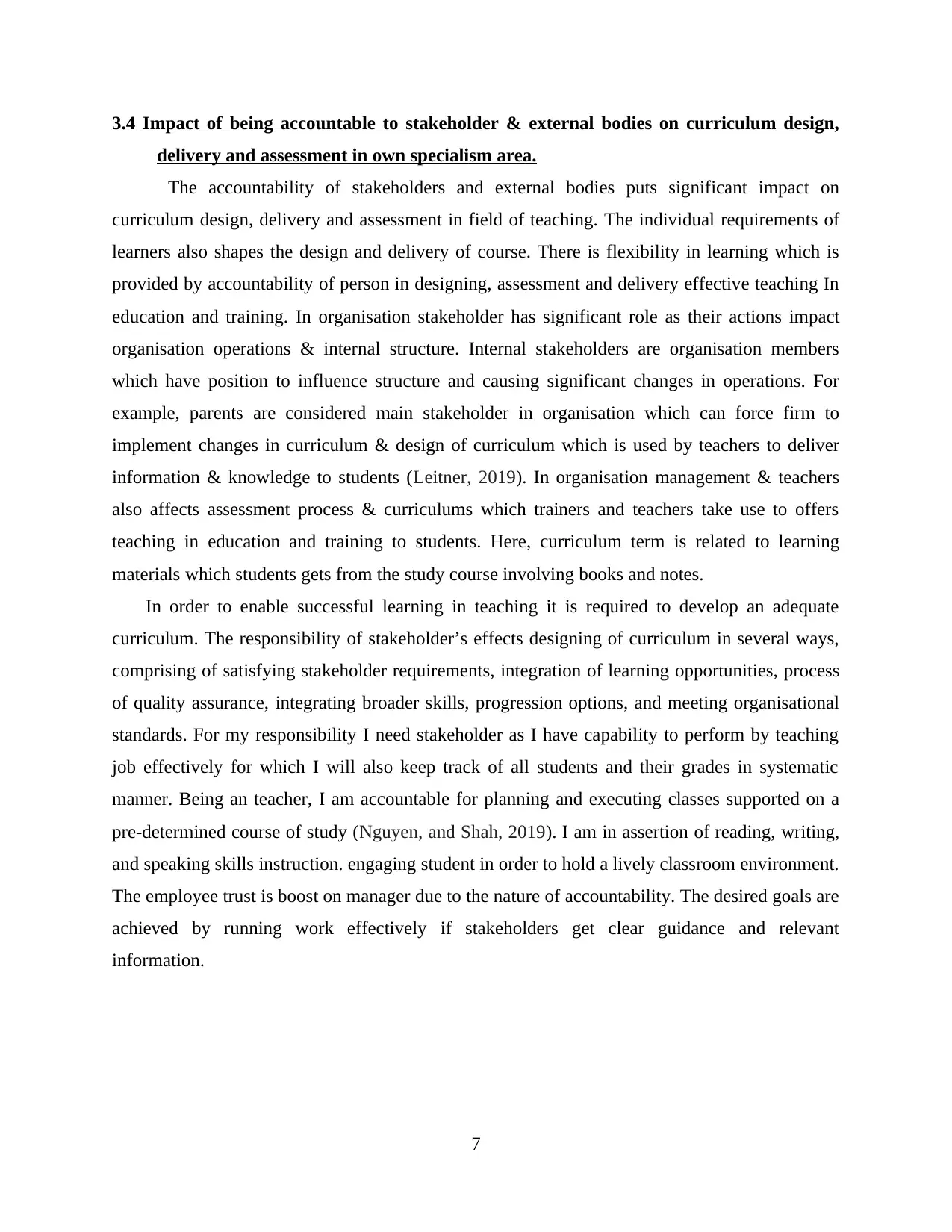
3.4 Impact of being accountable to stakeholder & external bodies on curriculum design,
delivery and assessment in own specialism area.
The accountability of stakeholders and external bodies puts significant impact on
curriculum design, delivery and assessment in field of teaching. The individual requirements of
learners also shapes the design and delivery of course. There is flexibility in learning which is
provided by accountability of person in designing, assessment and delivery effective teaching In
education and training. In organisation stakeholder has significant role as their actions impact
organisation operations & internal structure. Internal stakeholders are organisation members
which have position to influence structure and causing significant changes in operations. For
example, parents are considered main stakeholder in organisation which can force firm to
implement changes in curriculum & design of curriculum which is used by teachers to deliver
information & knowledge to students (Leitner, 2019). In organisation management & teachers
also affects assessment process & curriculums which trainers and teachers take use to offers
teaching in education and training to students. Here, curriculum term is related to learning
materials which students gets from the study course involving books and notes.
In order to enable successful learning in teaching it is required to develop an adequate
curriculum. The responsibility of stakeholder’s effects designing of curriculum in several ways,
comprising of satisfying stakeholder requirements, integration of learning opportunities, process
of quality assurance, integrating broader skills, progression options, and meeting organisational
standards. For my responsibility I need stakeholder as I have capability to perform by teaching
job effectively for which I will also keep track of all students and their grades in systematic
manner. Being an teacher, I am accountable for planning and executing classes supported on a
pre-determined course of study (Nguyen, and Shah, 2019). I am in assertion of reading, writing,
and speaking skills instruction. engaging student in order to hold a lively classroom environment.
The employee trust is boost on manager due to the nature of accountability. The desired goals are
achieved by running work effectively if stakeholders get clear guidance and relevant
information.
7
delivery and assessment in own specialism area.
The accountability of stakeholders and external bodies puts significant impact on
curriculum design, delivery and assessment in field of teaching. The individual requirements of
learners also shapes the design and delivery of course. There is flexibility in learning which is
provided by accountability of person in designing, assessment and delivery effective teaching In
education and training. In organisation stakeholder has significant role as their actions impact
organisation operations & internal structure. Internal stakeholders are organisation members
which have position to influence structure and causing significant changes in operations. For
example, parents are considered main stakeholder in organisation which can force firm to
implement changes in curriculum & design of curriculum which is used by teachers to deliver
information & knowledge to students (Leitner, 2019). In organisation management & teachers
also affects assessment process & curriculums which trainers and teachers take use to offers
teaching in education and training to students. Here, curriculum term is related to learning
materials which students gets from the study course involving books and notes.
In order to enable successful learning in teaching it is required to develop an adequate
curriculum. The responsibility of stakeholder’s effects designing of curriculum in several ways,
comprising of satisfying stakeholder requirements, integration of learning opportunities, process
of quality assurance, integrating broader skills, progression options, and meeting organisational
standards. For my responsibility I need stakeholder as I have capability to perform by teaching
job effectively for which I will also keep track of all students and their grades in systematic
manner. Being an teacher, I am accountable for planning and executing classes supported on a
pre-determined course of study (Nguyen, and Shah, 2019). I am in assertion of reading, writing,
and speaking skills instruction. engaging student in order to hold a lively classroom environment.
The employee trust is boost on manager due to the nature of accountability. The desired goals are
achieved by running work effectively if stakeholders get clear guidance and relevant
information.
7
Paraphrase This Document
Need a fresh take? Get an instant paraphrase of this document with our AI Paraphraser
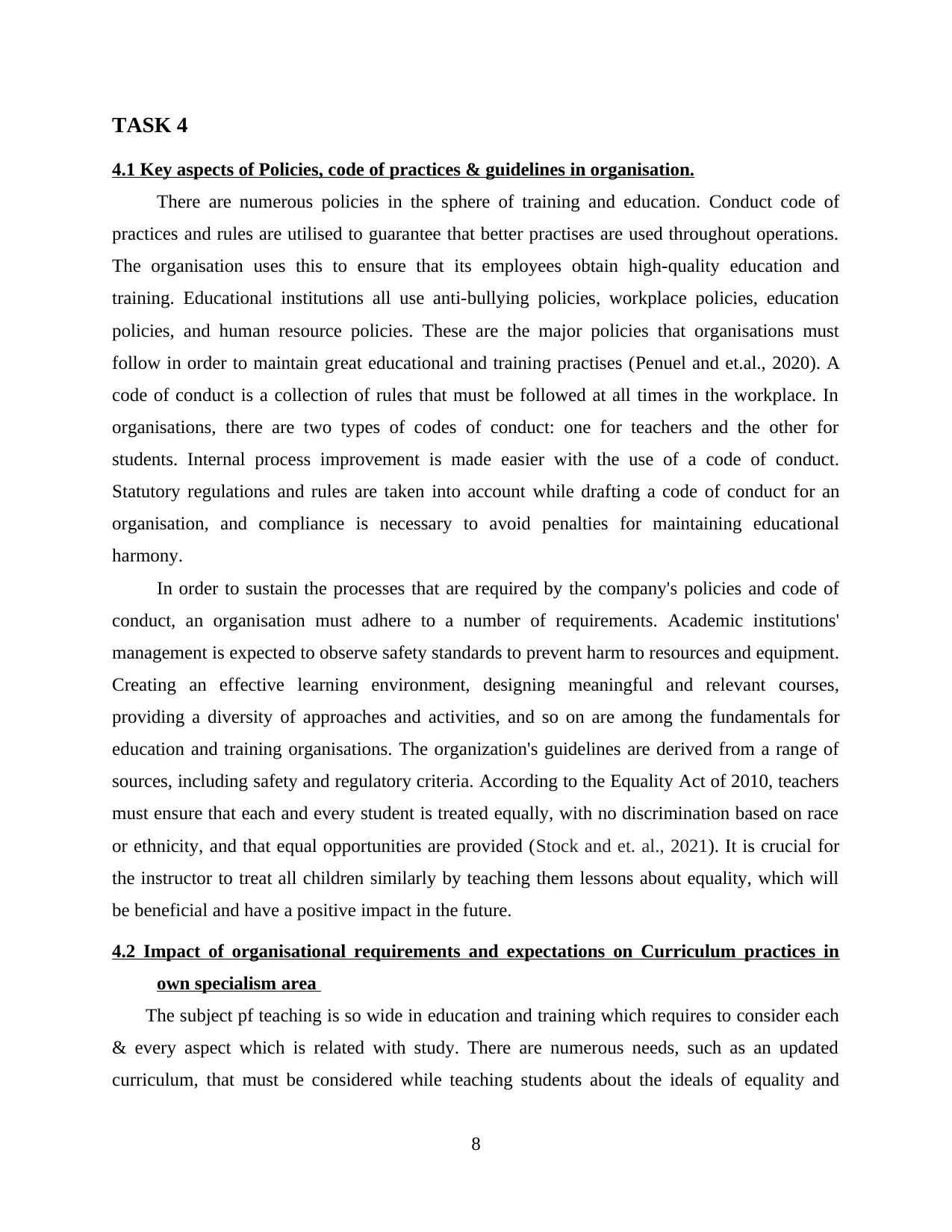
TASK 4
4.1 Key aspects of Policies, code of practices & guidelines in organisation.
There are numerous policies in the sphere of training and education. Conduct code of
practices and rules are utilised to guarantee that better practises are used throughout operations.
The organisation uses this to ensure that its employees obtain high-quality education and
training. Educational institutions all use anti-bullying policies, workplace policies, education
policies, and human resource policies. These are the major policies that organisations must
follow in order to maintain great educational and training practises (Penuel and et.al., 2020). A
code of conduct is a collection of rules that must be followed at all times in the workplace. In
organisations, there are two types of codes of conduct: one for teachers and the other for
students. Internal process improvement is made easier with the use of a code of conduct.
Statutory regulations and rules are taken into account while drafting a code of conduct for an
organisation, and compliance is necessary to avoid penalties for maintaining educational
harmony.
In order to sustain the processes that are required by the company's policies and code of
conduct, an organisation must adhere to a number of requirements. Academic institutions'
management is expected to observe safety standards to prevent harm to resources and equipment.
Creating an effective learning environment, designing meaningful and relevant courses,
providing a diversity of approaches and activities, and so on are among the fundamentals for
education and training organisations. The organization's guidelines are derived from a range of
sources, including safety and regulatory criteria. According to the Equality Act of 2010, teachers
must ensure that each and every student is treated equally, with no discrimination based on race
or ethnicity, and that equal opportunities are provided (Stock and et. al., 2021). It is crucial for
the instructor to treat all children similarly by teaching them lessons about equality, which will
be beneficial and have a positive impact in the future.
4.2 Impact of organisational requirements and expectations on Curriculum practices in
own specialism area
The subject pf teaching is so wide in education and training which requires to consider each
& every aspect which is related with study. There are numerous needs, such as an updated
curriculum, that must be considered while teaching students about the ideals of equality and
8
4.1 Key aspects of Policies, code of practices & guidelines in organisation.
There are numerous policies in the sphere of training and education. Conduct code of
practices and rules are utilised to guarantee that better practises are used throughout operations.
The organisation uses this to ensure that its employees obtain high-quality education and
training. Educational institutions all use anti-bullying policies, workplace policies, education
policies, and human resource policies. These are the major policies that organisations must
follow in order to maintain great educational and training practises (Penuel and et.al., 2020). A
code of conduct is a collection of rules that must be followed at all times in the workplace. In
organisations, there are two types of codes of conduct: one for teachers and the other for
students. Internal process improvement is made easier with the use of a code of conduct.
Statutory regulations and rules are taken into account while drafting a code of conduct for an
organisation, and compliance is necessary to avoid penalties for maintaining educational
harmony.
In order to sustain the processes that are required by the company's policies and code of
conduct, an organisation must adhere to a number of requirements. Academic institutions'
management is expected to observe safety standards to prevent harm to resources and equipment.
Creating an effective learning environment, designing meaningful and relevant courses,
providing a diversity of approaches and activities, and so on are among the fundamentals for
education and training organisations. The organization's guidelines are derived from a range of
sources, including safety and regulatory criteria. According to the Equality Act of 2010, teachers
must ensure that each and every student is treated equally, with no discrimination based on race
or ethnicity, and that equal opportunities are provided (Stock and et. al., 2021). It is crucial for
the instructor to treat all children similarly by teaching them lessons about equality, which will
be beneficial and have a positive impact in the future.
4.2 Impact of organisational requirements and expectations on Curriculum practices in
own specialism area
The subject pf teaching is so wide in education and training which requires to consider each
& every aspect which is related with study. There are numerous needs, such as an updated
curriculum, that must be considered while teaching students about the ideals of equality and
8
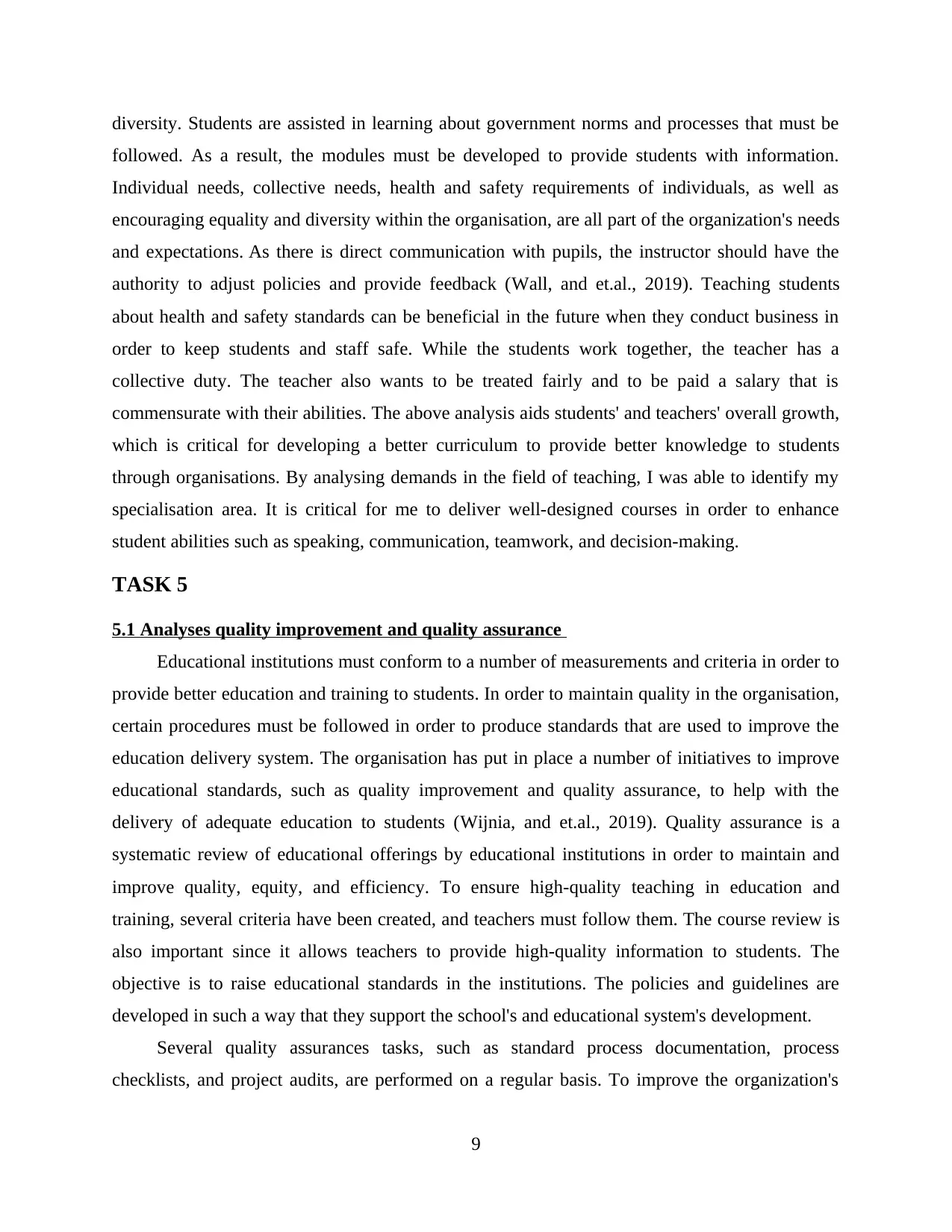
diversity. Students are assisted in learning about government norms and processes that must be
followed. As a result, the modules must be developed to provide students with information.
Individual needs, collective needs, health and safety requirements of individuals, as well as
encouraging equality and diversity within the organisation, are all part of the organization's needs
and expectations. As there is direct communication with pupils, the instructor should have the
authority to adjust policies and provide feedback (Wall, and et.al., 2019). Teaching students
about health and safety standards can be beneficial in the future when they conduct business in
order to keep students and staff safe. While the students work together, the teacher has a
collective duty. The teacher also wants to be treated fairly and to be paid a salary that is
commensurate with their abilities. The above analysis aids students' and teachers' overall growth,
which is critical for developing a better curriculum to provide better knowledge to students
through organisations. By analysing demands in the field of teaching, I was able to identify my
specialisation area. It is critical for me to deliver well-designed courses in order to enhance
student abilities such as speaking, communication, teamwork, and decision-making.
TASK 5
5.1 Analyses quality improvement and quality assurance
Educational institutions must conform to a number of measurements and criteria in order to
provide better education and training to students. In order to maintain quality in the organisation,
certain procedures must be followed in order to produce standards that are used to improve the
education delivery system. The organisation has put in place a number of initiatives to improve
educational standards, such as quality improvement and quality assurance, to help with the
delivery of adequate education to students (Wijnia, and et.al., 2019). Quality assurance is a
systematic review of educational offerings by educational institutions in order to maintain and
improve quality, equity, and efficiency. To ensure high-quality teaching in education and
training, several criteria have been created, and teachers must follow them. The course review is
also important since it allows teachers to provide high-quality information to students. The
objective is to raise educational standards in the institutions. The policies and guidelines are
developed in such a way that they support the school's and educational system's development.
Several quality assurances tasks, such as standard process documentation, process
checklists, and project audits, are performed on a regular basis. To improve the organization's
9
followed. As a result, the modules must be developed to provide students with information.
Individual needs, collective needs, health and safety requirements of individuals, as well as
encouraging equality and diversity within the organisation, are all part of the organization's needs
and expectations. As there is direct communication with pupils, the instructor should have the
authority to adjust policies and provide feedback (Wall, and et.al., 2019). Teaching students
about health and safety standards can be beneficial in the future when they conduct business in
order to keep students and staff safe. While the students work together, the teacher has a
collective duty. The teacher also wants to be treated fairly and to be paid a salary that is
commensurate with their abilities. The above analysis aids students' and teachers' overall growth,
which is critical for developing a better curriculum to provide better knowledge to students
through organisations. By analysing demands in the field of teaching, I was able to identify my
specialisation area. It is critical for me to deliver well-designed courses in order to enhance
student abilities such as speaking, communication, teamwork, and decision-making.
TASK 5
5.1 Analyses quality improvement and quality assurance
Educational institutions must conform to a number of measurements and criteria in order to
provide better education and training to students. In order to maintain quality in the organisation,
certain procedures must be followed in order to produce standards that are used to improve the
education delivery system. The organisation has put in place a number of initiatives to improve
educational standards, such as quality improvement and quality assurance, to help with the
delivery of adequate education to students (Wijnia, and et.al., 2019). Quality assurance is a
systematic review of educational offerings by educational institutions in order to maintain and
improve quality, equity, and efficiency. To ensure high-quality teaching in education and
training, several criteria have been created, and teachers must follow them. The course review is
also important since it allows teachers to provide high-quality information to students. The
objective is to raise educational standards in the institutions. The policies and guidelines are
developed in such a way that they support the school's and educational system's development.
Several quality assurances tasks, such as standard process documentation, process
checklists, and project audits, are performed on a regular basis. To improve the organization's
9
⊘ This is a preview!⊘
Do you want full access?
Subscribe today to unlock all pages.

Trusted by 1+ million students worldwide
1 out of 17
Related Documents
Your All-in-One AI-Powered Toolkit for Academic Success.
+13062052269
info@desklib.com
Available 24*7 on WhatsApp / Email
![[object Object]](/_next/static/media/star-bottom.7253800d.svg)
Unlock your academic potential
Copyright © 2020–2026 A2Z Services. All Rights Reserved. Developed and managed by ZUCOL.
